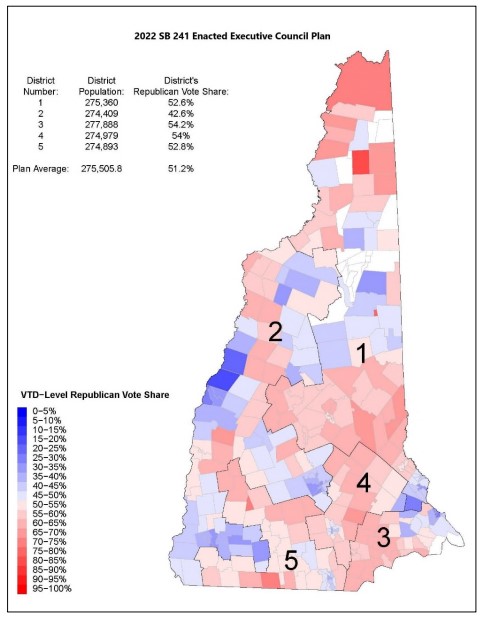By GARRY RAYNO, InDepthNHNH.org
CONCORD — The two newly signed 10-year, redistricting plans for the state Senate and Executive Council have been challenged in superior court, claiming they violate the state constitution. See lawsuit with maps here: https://indepthnh.org/wp-content/uploads/2022/05/2022-05-06_Brownv.Scanlan_Complaint-2.pdf
Filed by 12 citizens including a student, educators, business owners and a former Speaker of the House, from around the state in Hillsborough Superior Court South Friday, they seek a preliminary and permanent injunction blocking the two plans and ask the court to “adopt plans for New Hampshire’s Senate and Executive Council districts that comply with the New Hampshire Constitution.”
The two plans were signed into law Friday by Gov. Chris Sununu, who had said he would not sign any gerrymandered redistricting plans and that he would veto the map for the Congressional districts that has passed both the House and Senate.
The suit was filed with the support of the National Redistricting Foundation, which also supported the suit filed opposing the Congressional maps that had oral arguments before the state Supreme Court last week.
The suit challenging the state Senate and Executive Council plans claims the maps are partisan gerrymandering that violate several clauses of New Hampshire’s Constitution, including the free and equal elections clause, the guarantee of equal protection, and guarantees of free speech and association.
The Executive Council map creates one district that encompasses many Democratic strongholds such as Concord, Keene and the Upper Valley, along with four Republican favored districts.
The Senate plan creates eight heavily Democratic districts and 16 that favor Republicans, which would produce a GOP supermajority.
The latest partisan breakdown of voters shows registered Democrats outnumber registered Republicans, but there are more independent or undeclared voters than members of either party.
“These partisan gerrymanders defy the basic principles of representative government and will entrench Republican Party control over New Hampshire’s senate and executive council regardless of the wishes of the electorate,” said Marina Jenkins, the NRF’s Director of Litigation and Policy. “In drawing these plans, the Republican-controlled legislature systematically subordinated New Hampshire’s long-standing, non-partisan redistricting criteria for partisan gain.”
She said to highlight the egregious nature of the maps, the senate partisan gerrymander is so durable and extreme that Republicans could attain a supermajority in the upper chamber even if they lose the statewide popular vote.
“For decades, New Hampshire voters have been fiercely independent and closely divided in their support for Republican and Democratic candidates in statewide races,” Jenkins said. “Yet, the legislature has attempted to circumvent the will of the people by enacting these egregious gerrymanders.”
According to the suit, the two plans are classic examples of partisan gerrymandering using the “pack” and “crack” technique of concentrating one party’s voters in a few districts while diminishing their numbers in the other districts to the advantage of the other party.
“Apparently distrustful of the choices that New Hampshire voters will make at the polls, the General Court has decided for itself which party will control the Senate and Executive Council, rather than allowing the voters to freely choose the representatives they prefer,” according to the suit. “This violates the core principle of republican government, namely, that the voters should choose their representatives, not the other way around.”
The suit claims the two plans violate the free and equal elections clause of the state constitution “because they were enacted with impermissible partisan intent—specifically, to prevent Democratic voters from fairly and equally participating in the political process—and will achieve their intended effect.”
The plans also violate the state constitution’s guarantee of equal protection, by diluting the votes of Democratic voters, according to the suit.
Democrats are denied their right to substantially equal votes compared to Republicans under the plan, the lawyers maintain.
The suit also claims the plans violate the state constitution’s guarantees of free speech and association.
“In enacting these plans, the General Court engaged in viewpoint discrimination by retaliating against Democratic voters based on their political views and diluting their ability to band together and elect candidates of their choice,” the lawyers write.
The plaintiffs also claim the plans have no compelling state interest, but do serve the interest of Republican control of the state Senate and Executive Council.
“This Court should vindicate the fundamental rights of New Hampshire voters by enjoining future use of the Challenged Plans and ordering the creation and implementation of new Senate and Executive Council plans that comply with the requirements of the New Hampshire Constitution,” the attorneys write.
The suit notes that Sununu twice vetoed bills that would have established an independent redistricting commission claiming there is little gerrymandering in the state.
And members of the House Special Redistricting Committee acknowledged that partisan consideration was used to determine the drawing of Congressional districts, and that political affinity is one of the most important considerations in drawing the maps.
The suit goes over the 24 districts and how they were changed to better position Republicans to maintain control.
“Put simply, New Hampshire Republicans drew the Senate Plan with bizarrely shaped, non-compact districts that unnecessarily deviate from population equality and divide communities of interest, all to accomplish their clear and predominant objective: entrenching and expanding Republican control of the Senate,” the plaintiffs argue.
Similarly the suit explores the changes to the Executive Council map saying “the Executive Council plan’s bizarrely shaped districts cannot be explained by anything other than an intent to warp that body’s elections in favor of Republicans.”
The plaintiffs ask that they be granted their costs, disbursements and reasonable attorney fees.
The suit over the Congressional districts has a special master who will issue a report no earlier than May 27, the last scheduled meeting of the legislature this spring, which will be the topic of oral arguments May 31.
Garry Rayno may be reached at garry.rayno@yahoo.com.





